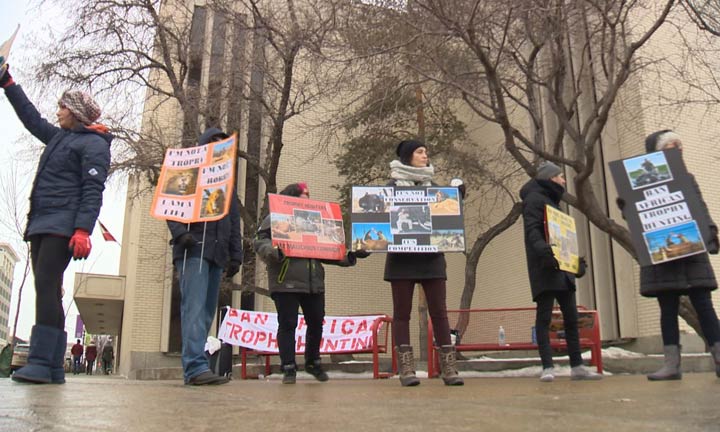An African trophy hunting trade show at the Hilton Garden Inn caused a stir on Saturday in downtown Saskatoon.

The group known as Ban African Trophy Hunting (BATH) gathered across the street from the hotel to raise awareness and protest of the event, which organizes hunting excursions in Africa.
“These people are not advertising the fact that they’re here, they don’t want anybody to know that this actually occurs,” BATH protest organizer Michael Donovan said.
“They’re recruiting people to go to Africa and hunt elephants, rhinos, lions and buffalo. Beautiful animals for pleasure, which is morally reprehensible in our opinion, to kill an animal for pleasure. Cut its head off to adore on a wall, I mean that does not belong in our civilized society today.”
READ MORE: Trophy hunting show in new venue after losing host following activists ‘threats’
Saskatoon police were called to a vehicle collision at the intersection of 1st Avenue and 22nd Street East on Saturday.
“The cops have asked us to stop. We’ve come to a compromise that we’re going to use the bullhorn mainly when traffic is stopped, in larger part. It’s impossible for all the traffic to stop and we’ve agreed to that compromise.”
The goal of BATH is to have the legislation enacted to radically curtail trophy hunting in Africa.
“They say that the money is going into the community support, which is a fabrication. Most of the money actually goes into the pockets of corrupt politicians, the wealthy landowners and the outfitters,” Donovan said.
“One other thing I should bring to everyone’s attention is that Canada is actually the largest exporter of trophy in the world, more than countries in Africa. People are not aware of this so trophy hunters are under the radar and we’re going to expose this vile practice … it’s got to stop.”
Donovan said independent studies have shown that trophy hunting is very detrimental wildlife in Africa.
However, an event organizer in Saskatoon said they believe that hunting in Africa has a very valuable contribution to conservation of wildlife species and natural habitats.
“The hunter basically acts as a natural predator and he pays a lot of money to shoot that animal. The meat, the skin and everything gets utilized by local people and, of course, the money that the hunter spent on harvesting that animal goes back into maintaining thriving wildlife populations,” The Africa Show event organizer Birgit Johnstone said.
- Trudeau tight-lipped on potential U.S. TikTok ban as key bill passes
- Canadian man dies during Texas Ironman event. His widow wants answers as to why
- Hundreds mourn 16-year-old Halifax homicide victim: ‘The youth are feeling it’
- On the ‘frontline’: Toronto-area residents hiring security firms to fight auto theft
READ MORE: African reserve where Cecil the lion lived may have to kill 200 lions due to overpopulation
Johnstone said she’s been organizing these events since 2009 and the protests only started last year with the Cecil the lion incident.
“These people are running businesses … a portion of it is a profit and another portion goes into paying wages to staff, providing jobs and maintaining the wildlife populations. If you’ve got a farm, you want to make sure you have thriving game populations so that you can have clients that want to come and hunt,” Johnstone said.
“In Africa, there’s a saying ‘if it pays, it stays.’ If there’s a value to these animals, it’s worth the local people protecting them. If there’s no value to the animals, those animals will be replaced by cattle or goats.”
Johnstone said she understands if somebody doesn’t like the act of trophy hunting but added that she’s learned how important the money from hunting is towards conservation after living in Africa for 30 years.
“I have no problem with the protesters. They’re entitled to their opinion and as long as they don’t have any defamatory remarks to be made against the people that I have here and I represent here, they’re welcome to protest,” Johnstone added.



Comments